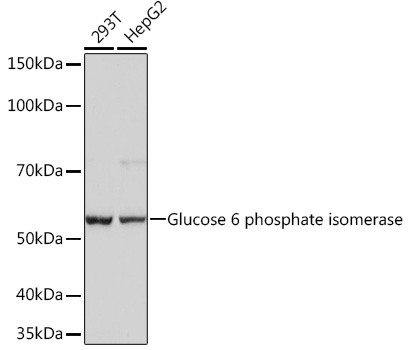Metabolism Antibodies 3
Anti-GPI Antibody (CAB4401)
- SKU:
- CAB4401
- Product Type:
- Antibody
- Reactivity:
- Human
- Reactivity:
- Rat
- Host Species:
- Rabbit
- Isotype:
- IgG
- Research Area:
- Metabolism
Description
| Antibody Name: | Anti-GPI Antibody |
| Antibody SKU: | CAB4401 |
| Antibody Size: | 20uL, 50uL, 100uL |
| Application: | WB |
| Reactivity: | Human, Rat |
| Host Species: | Rabbit |
| Immunogen: | A synthesized peptide derived from human Glucose 6 phosphate isomerase |
| Application: | WB |
| Recommended Dilution: | WB 1:500 - 1:2000 |
| Reactivity: | Human, Rat |
| Positive Samples: | 293T, HepG2, Rat brain |
| Immunogen: | A synthesized peptide derived from human Glucose 6 phosphate isomerase |
| Purification Method: | Affinity purification |
| Storage Buffer: | Store at -20'C. Avoid freeze / thaw cycles. Buffer: PBS with 0.02% sodium azide, 0.05% BSA, 50% glycerol, pH7.3. |
| Isotype: | IgG |
| Sequence: | Email for sequence |
| Gene ID: | 2821 |
| Uniprot: | P06744 |
| Cellular Location: | |
| Calculated MW: | 63kDa |
| Observed MW: | 60KDa |
| Synonyms: | AMF, GNPI, NLK, PGI, PHI, SA-36, SA36 |
| Background: | This gene encodes a member of the glucose phosphate isomerase protein family. The encoded protein has been identified as a moonlighting protein based on its ability to perform mechanistically distinct functions. In the cytoplasm, the gene product functions as a glycolytic enzyme (glucose-6-phosphate isomerase) that interconverts glucose-6-phosphate and fructose-6-phosphate. Extracellularly, the encoded protein (also referred to as neuroleukin) functions as a neurotrophic factor that promotes survival of skeletal motor neurons and sensory neurons, and as a lymphokine that induces immunoglobulin secretion. The encoded protein is also referred to as autocrine motility factor based on an additional function as a tumor-secreted cytokine and angiogenic factor. Defects in this gene are the cause of nonspherocytic hemolytic anemia and a severe enzyme deficiency can be associated with hydrops fetalis, immediate neonatal death and neurological impairment. Alternative splicing results in multiple transcript variants. [provided by RefSeq, Aug 2016] |
| UniProt Protein Function: | G6PI: belongs to the GPI family whose members encode multifunctional phosphoglucose isomerase proteins involved in energy pathways. A dimeric enzyme that catalyzes the reversible isomerization of glucose-6-phosphate and fructose-6-phosphate. Functions in different capacities inside and outside the cell. In the cytoplasm, the gene product is involved in glycolysis and gluconeogenesis, while outside the cell it functions as a neurotrophic factor for spinal and sensory neurons. Defects in this gene are the cause of nonspherocytic hemolytic anemia and a severe enzyme deficiency can be associated with hydrops fetalis, immediate neonatal death and neurological impairment. |
| UniProt Protein Details: | Protein type:Isomerase; Carbohydrate Metabolism - starch and sucrose; Carbohydrate Metabolism - amino sugar and nucleotide sugar; EC 5.3.1.9; Carbohydrate Metabolism - glycolysis and gluconeogenesis; Cytokine; Carbohydrate Metabolism - pentose phosphate pathway; Apoptosis Chromosomal Location of Human Ortholog: 19q13.1 Cellular Component: nucleoplasm; extracellular space; neuron projection; membrane; cytoplasm; plasma membrane; cytosol Molecular Function:monosaccharide binding; glucose-6-phosphate isomerase activity; growth factor activity; cytokine activity; intramolecular transferase activity Biological Process: aldehyde catabolic process; methylglyoxal biosynthetic process; glycolysis; glucose 6-phosphate metabolic process; glucose metabolic process; pathogenesis; negative regulation of caspase activity; humoral immune response; gluconeogenesis; learning and/or memory; hemostasis; carbohydrate metabolic process; negative regulation of neuron apoptosis; angiogenesis Disease: Hemolytic Anemia, Nonspherocytic, Due To Glucose Phosphate Isomerase Deficiency |
| NCBI Summary: | This gene encodes a member of the glucose phosphate isomerase protein family. The encoded protein has been identified as a moonlighting protein based on its ability to perform mechanistically distinct functions. In the cytoplasm, the gene product functions as a glycolytic enzyme (glucose-6-phosphate isomerase) that interconverts glucose-6-phophsate and fructose-6-phosphate. Extracellularly, the encoded protein (also referred to as neuroleukin) functions as a neurotrophic factor that promotes survival of skeletal motor neurons and sensory neurons, and as a lymphokine that induces immunoglobulin secretion. The encoded protein is also referred to as autocrine motility factor based on an additional function as a tumor-secreted cytokine and angiogenic factor. Defects in this gene are the cause of nonspherocytic hemolytic anemia and a severe enzyme deficiency can be associated with hydrops fetalis, immediate neonatal death and neurological impairment. Alternative splicing results in multiple transcript variants. [provided by RefSeq, Jan 2014] |
| UniProt Code: | P06744 |
| NCBI GenInfo Identifier: | 17380385 |
| NCBI Gene ID: | 2821 |
| NCBI Accession: | P06744.4 |
| UniProt Secondary Accession: | P06744,Q9BRD3, Q9BSK5, Q9UHE6, B4DG39, |
| UniProt Related Accession: | P06744 |
| Molecular Weight: | 558 |
| NCBI Full Name: | Glucose-6-phosphate isomerase |
| NCBI Synonym Full Names: | glucose-6-phosphate isomerase |
| NCBI Official Symbol: | GPI |
| NCBI Official Synonym Symbols: | AMF; NLK; PGI; PHI; GNPI; SA36; SA-36 |
| NCBI Protein Information: | glucose-6-phosphate isomerase; neuroleukin; oxoisomerase; sperm antigen 36; sperm antigen-36; phosphohexomutase; phosphosaccharomutase; phosphohexose isomerase; phosphoglucose isomerase; autocrine motility factor; hexosephosphate isomerase; glucose phosph |
| UniProt Protein Name: | Glucose-6-phosphate isomerase |
| UniProt Synonym Protein Names: | Autocrine motility factor; AMF; Neuroleukin; NLK; Phosphoglucose isomerase; PGI; Phosphohexose isomerase; PHI; Sperm antigen 36; SA-36 |
| Protein Family: | Glucose-6-phosphate isomerase |
| UniProt Gene Name: | GPI |
| UniProt Entry Name: | G6PI_HUMAN |





![GPI Monoclonal Antibody [PAT22G2AT] (CPAB0217) GPI Monoclonal Antibody [PAT22G2AT] (CPAB0217)](https://cdn11.bigcommerce.com/s-rd6ounxcu2/images/stencil/590x590/products/58443/63625/assay-genie-box-4__53625.1706535014.jpg?c=1)

